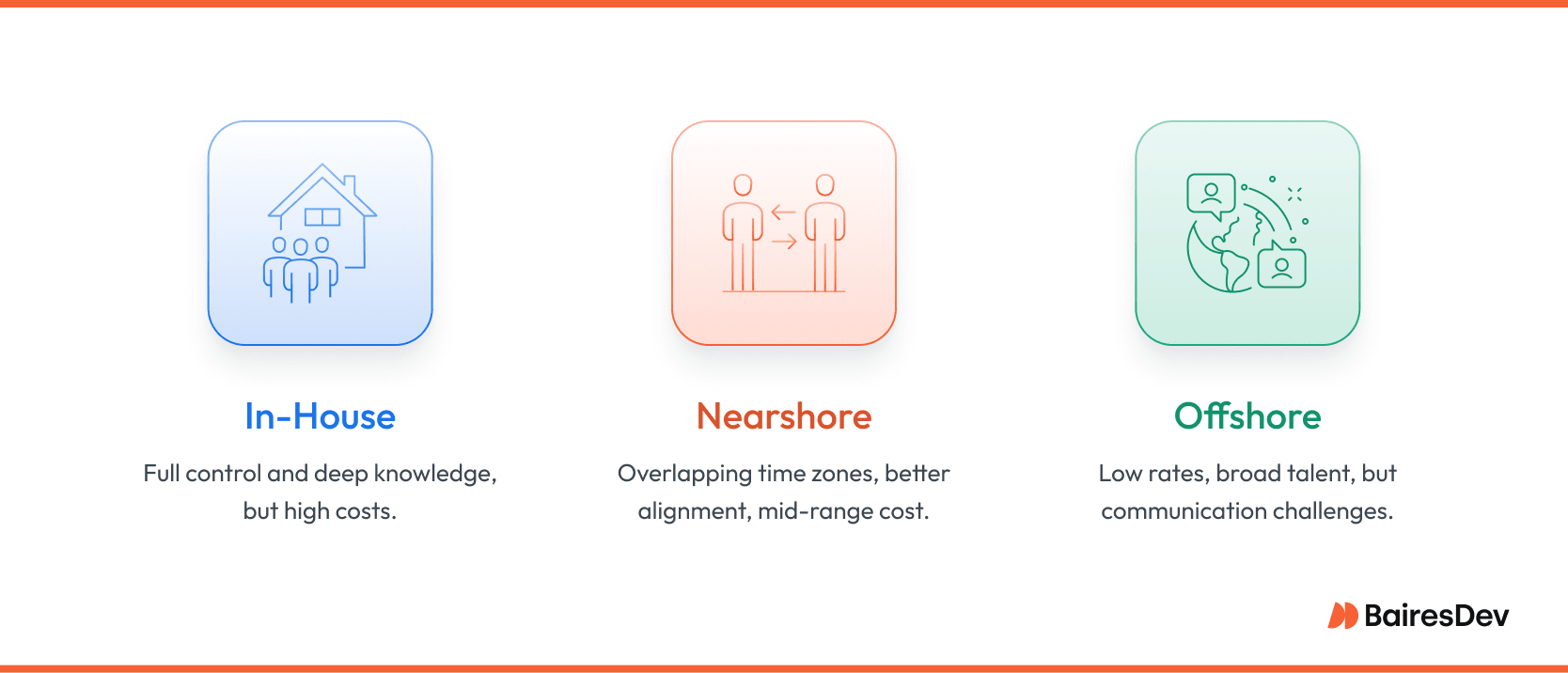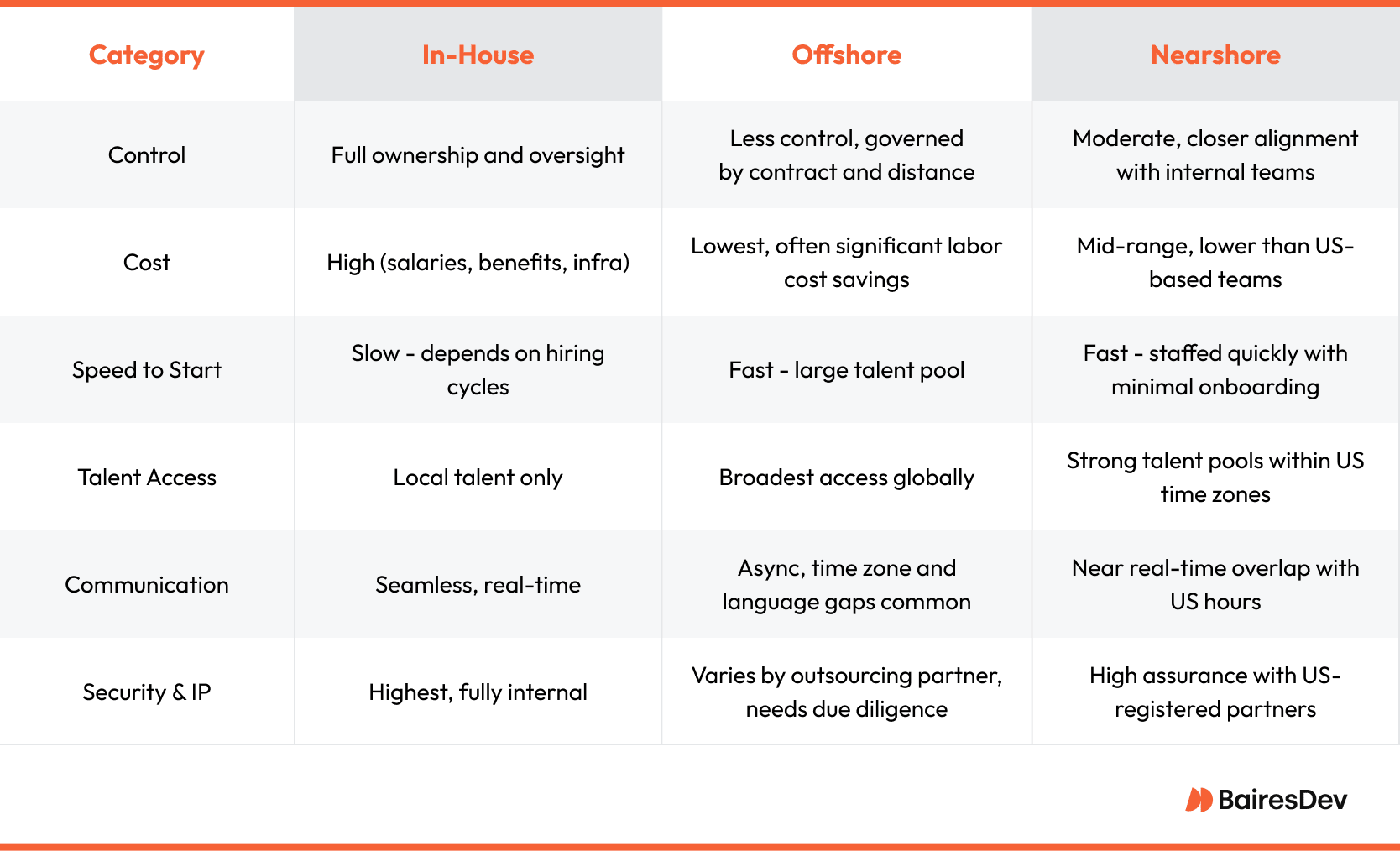How you spend your time and money can make or break your business. Nowhere is this more clear than making the choice between keeping your software development projects in-house or outsourcing. You need software that’s streamlined, reusable, and most of all, software that works. But what’s the most resource-efficient way of developing it?
Some IT decision-makers prefer in-house teams because they maintain institutional knowledge, while others appreciate the fast access to expertise that comes with hiring an outsourced vendor. Outsourcing can also address the need for specific skills needed for niche development projects. So what are the pros and cons of each approach? And is there a better way?

Outsourcing software development services means hiring a third party to handle development. However, not all outsourcing is created equal. Your outsourced team may be located in the same time zone or on the other side of the globe.
As the name implies, offshore software development is typically associated distant markets, for example Asia or Eastern Europe. Nearshore teams work from countries closer to home. In the case of the United States, nearshore software development often takes place in Latin America. Time zone alignment ensures better communication and easier integration into existing teams.
Strategic Considerations
Software development isn’t just about building features and writing code. The development process needs to move fast without compromising quality standards, all while maintaining security and compliance. Scaling presents companies with another challenge, as sourcing specialized expertise can take months.
Bringing in external help to plug skills gaps or cut costs sounds tempting, but caveats apply. Outsourcing and async offshoring work best for:
- Distributed teams or startups experiencing rapid growth or lacking resources to hire locally
- Small projects with well-defined scopes that don’t require time zone alignment
- Efforts involving specialized skills not available locally
- Cost-sensitive projects where reducing overhead is the top priority
- Non-core systems that don’t require deep understanding of the domain
In-house production provides direct control over the development process, allowing companies to tailor the software to their specific needs. This approach ensures that the software aligns perfectly with the company’s culture and business objectives. However, it also demands a significant investment in recruiting, training, and retaining skilled developers. It makes more sense for:
- Long-term and high-complexity projects that require a lot of institutional knowledge
- Mission-critical platforms with stringent security and compliance standards
- Highly integrated stacks with many dependencies across departments
This is not a binary choice. Many companies successfully outsource specific tasks while keeping core architecture and product leadership in-house.
Nearshoring offers another alternative, positioned as the middle ground between overseas offsourcing and using an in-house development team. Nearshoring offers several benefits for established companies and enterprises with complex stacks and compliance requirements:
- Large nearshoring firms have extensive enterprise experience and cater to regulated industries
- Time zone alignment benefits Agile delivery, communication and coordination
- Many nearshoring firms are registered in the US, streamlining procurement and mitigating risk
In some scenarios, nearshoring combines the speed and flexibility of offshoring with the alignment similar to an internal team. The same is true of overhead. Nearshore providers cannot offer the rates found in some overseas markets, yet they offer substantial savings compared to using US-based teams.

The Pros and Cons of In-House and Outsourced Development
IT decision makers have a lot to consider when determining whether to pursue software outsourcing.
Statistics show that the virtues of software outsourcing have made it a popular option, as 54% of US firms already use outsourced teams. In addition to saving money, outsourcing allows companies to focus on their core competencies and use their senior talent more efficiently.
Forty-five percent of firms who use outsourcing do it to better control costs, while 46% say it helps them access a wider skill set than local teams alone can offer. Outsourcing to different countries presents both challenges and benefits, such as communication barriers and cultural differences, but also cost-effectiveness and access to diverse talent. Moreover, outsourcing can eliminate the need office space.
Outsourcing offers scalability and flexibility, especially during peak seasons, allowing companies to quickly scale their customer support staff during high-demand periods.

In-House Resources
Pros
- Direct oversight from kickoff to deploy: You see the code, sit in the stand-ups, and can reset priorities before lunch if a VP calls. That immediacy helps when requirements are still evolving or security vets need eyes on every pull request.
- Accumulated domain expertise: Dedicated teams embedded for years learn the quirks of your billing engine, the politics behind feature flags, and which legacy API fails on the last Friday of each quarter. That context shortens debug cycles and improves architectural decisions.
- Stronger cross-functional chemistry: Designers, product managers, and engineers share the same Slack channels and hallway chatter. Informal conversations and transparent communication often identify edge cases that formal specs miss.
- Straightforward compliance posture: Data never leaves your network. Auditors see a single chain of custody. That simplicity is valuable in healthcare, finance, or any highly regulated industry.
Cons
- High fixed burn: A senior backend hire in a tier-one US city can top $200k before benefits. Multiply that by a full Scrum team and overhead climbs fast.
- Talent scarcity slows roadmaps: Top engineers field daily recruiter pings. Finding four strong React developers or a Site Reliability Engineer can take three to six months, which stalls new initiatives.
- Attrition risk: When you lose a team lead you also lose a chunk of architecture lore. Replacing that knowledge often takes longer than replacing the headcount.
- Limited elasticity: Spinning up a new squad for a three-month spike sounds easy until finance pushes back on headcount or IT runs out of laptops.
Outsourced Development
Pros
- Rapid capacity on demand: A mature vendor can onboard a squad in two weeks with engineers who already know the tech stack. That speed turns stalled projects into scheduled releases.
- Access to niche skills: Need a computer-vision expert or someone fluent in COBOL for a short migration? Outsourcing lets you find the right talent for the sprint.
- Variable spend: Expenses land in the operating budget rather than payroll. When the project ends the cost drops to zero, which helps CFOs watching run-rate.
- Operational focus: Internal architects stay on strategic initiatives while the partner closes backlog items, writes test suites, and handles overnight deployments.
Cons
- Coordination overhead: Different calendars, work holidays, and time zone differences create gaps. Without disciplined project management a simple scope question can sit twelve hours before it reaches the right person.
- Quality control issues: Not all vendors enforce code reviews or automated testing. If you pick purely on price you may pay again in refactoring.
- Data and IP exposure: External teams need access to your repos and sample data. That requires strict NDAs, network segmentation, and periodic audits. Intellectual property theft remains a risk.
- Vendor dependency: When a partner reassigns key developers midway through a release your velocity drops until replacements come up to speed.
Quick Note on Nearshore Partners
Nearshore teams often strike a balance. Rates sit below US market yet above deep-offshore. More importantly, work hours overlap, and cultural cues are closer. Daily stand-ups land at normal hours, and requirements rarely get lost in translation. For many US-based leaders that trade-off delivers most of the cost relief with far fewer coordination headaches and language barriers.
Conducting a Cost-Benefit Analysis
When deciding between in-house and outsourced software development, companies must conduct a thorough cost-benefit analysis. This involves weighing the costs of in-house development, including recruiting, training, and retaining talented developers, against the costs of outsourcing, including vendor fees and potential risks.
Companies must also consider the benefits of each approach, including the potential for cost savings, increased efficiency, and improved quality. A cost-benefit analysis can help companies determine which approach is most cost-effective and aligns with their business goals and objectives. The analysis should consider both short-term and long-term costs and benefits, as well as the potential risks and opportunities associated with each approach. When it comes to inexpensive deep-offshore vendors, much depends on the company’s risk tolerance, too. Sometimes, the gamble pays off, but sometimes it is better to accept higher upfront costs to avoid rebuilds down the line.
By conducting a thorough cost-benefit analysis, companies can make an informed decision that saves costs and minimizes risks while maximizing benefits. The analysis should also consider the company’s ability to manage and communicate with an external team, as well as its ability to maintain complete control over the development process. Ultimately, the goal of the cost efficiency analysis is to determine which approach provides the best value for the company, while achieving its software development goals and objectives.
How to Transcend the Limitations of In-House Software Development with Nearshore Outsourcing
As important as time and money are to your business, there’s another resource that’s just as valuable: people. That’s what gives outsourcing an advantage over in-house development; it offers access to the best talent and diverse skills, at a low cost that helps control costs.
Using long-term contracts with third-party companies can also mitigate issues like finding new contractors and the associated delays and costs. Nearshore developers are closer to home, so they make it easier for you to maintain full control your development projects. They often operate within a similar culture, have teams who speak a shared language, and are located in similar time zones. So not only does this make communication easier and more convenient, the right nearshore outsourcing firm can staff projects in a matter of days.
Effective communication between project teams and management leads to a better understanding of tasks and expectations, reducing delays and enhancing overall project efficiency. Nearshore outsourcing also offers better cost control over time, providing a clearer understanding of financial implications and long-term savings.
Evaluating the financial implications of nearshore outsourcing shows that while it may require a smaller initial investment compared to in-house development, it can introduce hidden costs. However, the financial benefits of nearshore outsourcing, such as lower costs due to suppliers’ purchasing power and expertise, contribute to increased profit margins for businesses.
Your time and money are precious. So why bear the workload of in-house development, or waste time miscommunicating with offshore firms? Nearshore development solves these problems and develops software to your specifications, right in your backyard.






